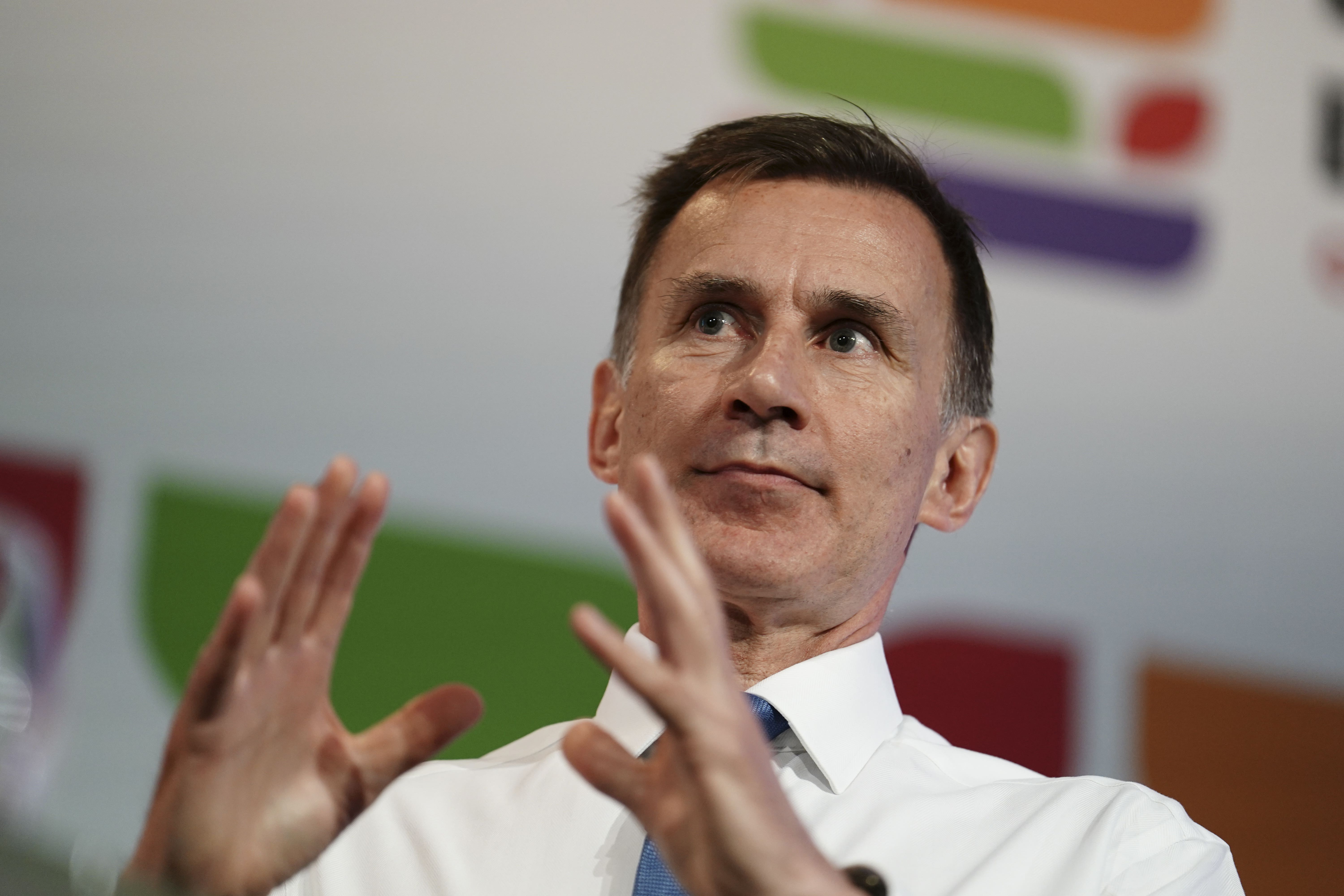Hunt ‘working on solution’ to ensure banks pass on interest rate rises to savers
The Chancellor made the comments as he outlined the ‘mortgage charter’ to MPs.

Your support helps us to tell the story
From reproductive rights to climate change to Big Tech, The Independent is on the ground when the story is developing. Whether it's investigating the financials of Elon Musk's pro-Trump PAC or producing our latest documentary, 'The A Word', which shines a light on the American women fighting for reproductive rights, we know how important it is to parse out the facts from the messaging.
At such a critical moment in US history, we need reporters on the ground. Your donation allows us to keep sending journalists to speak to both sides of the story.
The Independent is trusted by Americans across the entire political spectrum. And unlike many other quality news outlets, we choose not to lock Americans out of our reporting and analysis with paywalls. We believe quality journalism should be available to everyone, paid for by those who can afford it.
Your support makes all the difference.Chancellor Jeremy Hunt has said he is “working on a solution” to ensure banks act quicker to pass on interest rate rises to savers.
Mr Hunt said he told bank bosses in “no uncertain terms” that there is an issue after acknowledging it is currently “taking too long” for them to pass on the changes to savers.
His remarks came as MPs pressed the Government to take further action after lenders representing over 75% of the market agreed to a “mortgage charter”, providing support for residential mortgage customers.
Speaking in the Commons, Labour former Treasury minister Dame Angela Eagle said: “Doesn’t he worry that the banks are being very slow to pass on interest rate rises to those who are saving whilst they are passing almost immediately interest rate rises on to those who borrow, which makes the interest rate mechanism much less effective in dealing with the inflation situation?
“And did he notice, like I did, that the banks this quarter made over £4 billion extra on the differential between these?
“So shouldn’t he be much tougher on the banks and what is he going to do to stop this profiteering?”
I raised that issue in no uncertain terms with the banks when I met them and I'm working on a solution because I think it is an issue that needs resolving
Mr Hunt replied: “(Dame Angela) is absolutely right, it is taking too long for the increases in interest rates to be passed on to savers, particularly with instant access accounts – the rates are more frequently being passed on to people who have fixed-term, fixed-notice accounts.
“But she’s right, there is an issue there. I raised that issue in no uncertain terms with the banks when I met them and I’m working on a solution because I think it is an issue that needs resolving.”
Conservative MP Mark Pritchard (The Wrekin) welcomed the “mortgage charter” but said: “Constituents are suffering, they are very concerned, many are having to choose between food, clothes, shoes and paying the mortgage or paying the rent, and decisions we make here – either as a governing party or cross-party – are having a direct impact on individuals’ lives every single day.
“So can I join cross-party with (Dame Angela) and say she is absolutely right that so often when the base rate rises, lenders are very quick to raise interest rates on our constituents, and when they fall – and they surely will fall and hopefully very soon, possibly in the autumn, we’ll see – can (Mr Hunt) make sure that those reductions are passed on as quickly as possible to our constituents?”
Mr Hunt defended the Government’s record on supporting people, adding: “One thing that can definitely happen better than it is now is passing on increases in the base rates to savers.”
The Bank of England last week hiked the base rate from 4.5% to 5%.
According to figures released by Moneyfactscompare.co.uk last Friday, the average easy access savings rate was 2.35% while the average easy access Isa rate was 2.47%. Both of these average rates were unchanged from Thursday, Moneyfacts said.
Conservative MP Anna Firth (Southend West) noted the majority of the mortgage market is fixed rather than floating, adding: “Rising short-term interest rates will not necessarily result in falling inflation and we do need to look at other measures, such as making sure that interest rates are passed on to savers so they keep their money in the bank.”
If more people are encouraged to save, that is technically counter-inflationary and is something to be encouraged
Conservative former minister Robin Walker also urged the Chancellor to “encourage the banks to pass on interest rates to savers”.
Mr Hunt replied: “If more people are encouraged to save, that is technically counter-inflationary and is something to be encouraged.”
Elsewhere, the Chancellor said the Government “won’t flinch in our resolve” to halve inflation and offered assurances over the role of the Bank of England.
He said: “In my dealings with the Bank of England I have never once had any reason to question their resolve to hit the target but we need to make sure the forecasting is better.”
Outside of the Commons, Leeds Building Society and the Nottingham Building Society confirmed they are also backing the new “mortgage charter”.
Among the measures, borrowers will be able to switch to an interest-only mortgage for six months, or extend their mortgage term to reduce their monthly payments and switch back to their original term within the first six months, if they choose to.
Both options can be taken without a new affordability check or it affecting their credit score.
Lenders have also agreed to implementing a 12-month minimum period before repossessing homes.
The measures are being rolled out by lenders over the coming weeks.